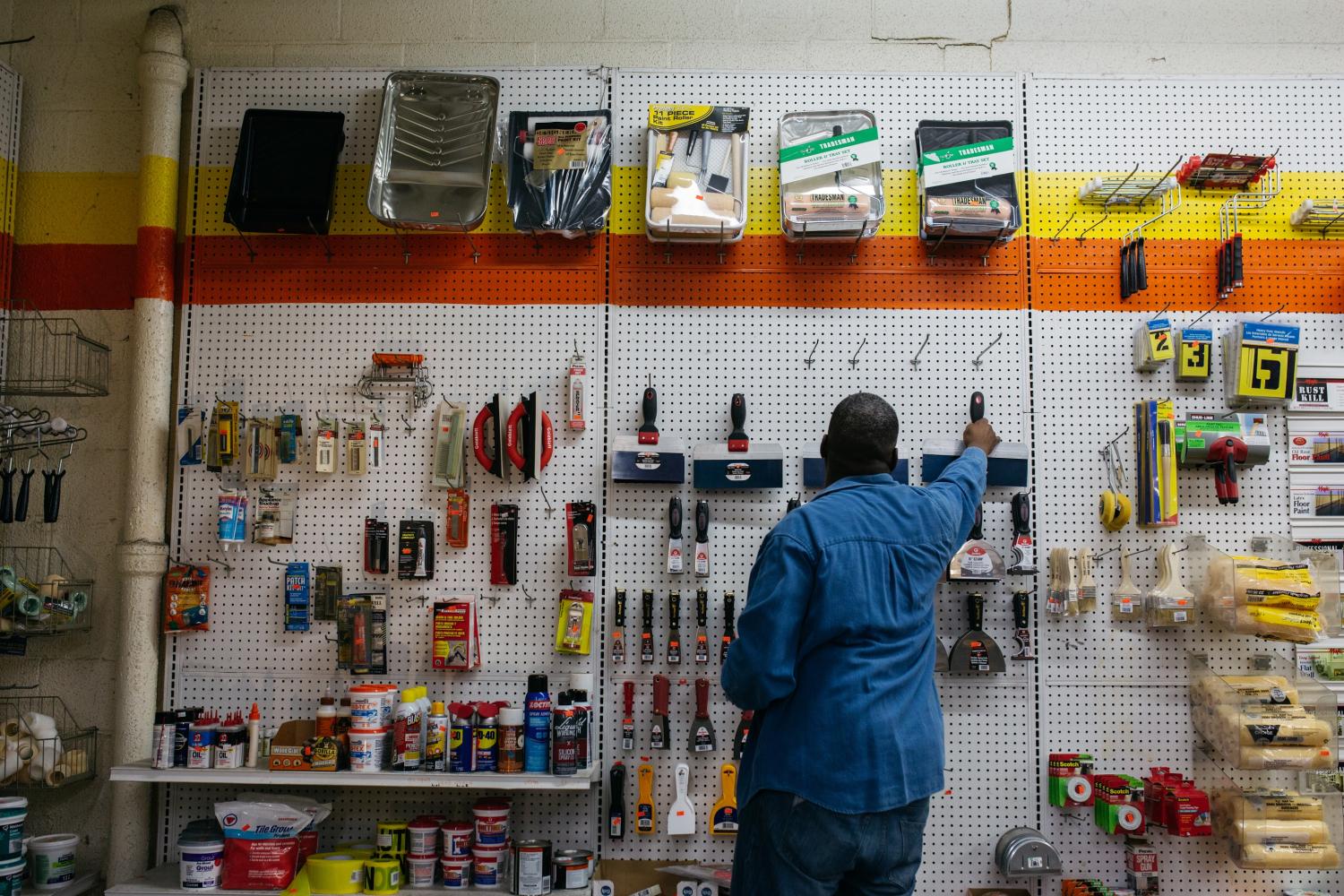This is a Spotlight on Local Recovery Efforts case study, a product of the COVID-19 Metro Recovery Watch.
Summary
The New Economy Initiative (NEI) is a philanthropic entrepreneurial development initiative made up of national and local foundations working to build an inclusive support network for entrepreneurs and small businesses in Southeast Michigan. It provides grants to nonprofit organizations that support small businesses, particularly those that are minority- and women-led. With its large scale of funds and a history of supporting Detroit’s small business ecosystem, NEI’s work is especially important during the COVID-19 pandemic because it is well positioned to understand and support the needs of local small and minority-owned businesses, which have been especially devasted. In response to the pandemic, NEI has further expanded access to capital and practical assistance to small businesses.
NEI’s work is crucial for Detroit given its history of segregation and disinvestment in communities of color. A 2018 Washington Post article describes Detroit as being “the most segregated metropolitan area [in the US] since 1990.” This is highly relevant because a vast array of social science scholarship has found residential segregation to be detrimental to Black Americans. Sociologist Douglas Massey wrote, “As a result of segregation, poor Blacks are forced to live in conditions of intensely concentrated poverty,” ultimately bringing much higher risks of educational failure, joblessness, crime, and premature death compared to other groups. This finding supports the need for organizations such as NEI, which spur job creation, especially in the region’s underfunded communities of color.
COVID-19 has hit Detroit and its minority communities particularly hard. Though it only has 6.7% of Michigan’s population, as of late June 2020, Detroit had 17.7% of the state’s COVID-19 cases and 23.6% of its deaths. In late May 2020, Detoit’s unemployment was estimated to be 48%, compared to 23% in Michigan as a whole. Moreover, Black Detroiters were about four times as likely as white residents to know someone who died of COVID-19, indicating a major racial disparity in the disease’s impact.
In addition, NEI director Pam Lewis pointed out two vulnerabilities that are specific to Detroit small businesses during the COVID-19 pandemic. First, many of the city’s very small businesses are minority-owned, have under three employees, have less liquidity, or in the retail, restaurant, construction, and personal care industries, all of which are particularly susceptible to revenue loses as a result of social distancing. Second, banks administering government loans to small businesses provide little support to Latino- or Hispanic- and Black-owned companies. The Paycheck Protection Program (PPP), the federal government’s primary method to assist small businesses, uses banks to distribute the funding. This issue is particularly salient given that Detroit’s rate of Black-owned businesses is eight times times higher than that of the nation as a whole.
Execution
In 2007, 10 regional foundations came together to establish a $100 million fund housed in the Community Foundation for Southeast Michigan focused on growing the local economy through innovation, entrepreneurship, and culture change. They created the New Economy Initiative (NEI), now made up of 13 local and national foundations and managed by four staff members from the Community Foundation for Southeast Michigan. Its work is advised by a steering committee of local entrepreneurs and NEI funders.
NEI identifies key programs and nonprofit organizations that support entrepreneurs and accepts grant proposals on an invitation-only basis. The NEI grant review committee—a subgroup of the NEI steering committee—recommends projects and organizations to fund. As NEI is housed within the Community Foundation for Southeast Michigan, the Foundation’s board of trustees officially approves all NEI grants recommended by the grant review committee. Its earliest investments supported innovation and talent. Since 2012, NEI has expanded its focus to include small neighborhood businesses and aims to create a strong and equitable business support ecosystem. Grantees include community development financial institutions (CDFIs), microfinance programs, practical-assistance service providers, neighborhood-based community development coroporations, coworking and lab spaces, and business idea competitions. NEI targets organizations that support underserved communities and entrepreneurs.
In response to COVID-19, NEI offered close to $2.1 million in loan and rent relief to organizations it funds, freeing those organizations’ business clients’ capital to address other needs. NEI also provided $1.4 million in grants to microbusiness owners. NEI compliments its loan and grant relief by funding business support organizations that are involved in the new 313Strong program. 313Strong provides one-on-one coaching, a free QuickBooks license, and access to business experts. By stretching its impact between both access to capital and business support entities, NEI is uniquely serving as an entrepreneurship ecosystem funder and builder during the COVID-19 crisis and recovery, making this a response that will help small businesses to thrive even after the pandemic. Additionally, considering that NEI was already focused on small neighborhood businesses—including minority-owned businesses and microbusinesses—NEI was well positioned to understand their needs for recovery, which in turn informed where to best pump substantial relief funds to support them accordingly. For example, NEI knows that existing financial institutions are less likely to serve minority-owned businesses and microbusinesses, making these businesses more likely to miss out on the Paycheck Protection Program. For this reason, NEI targeted its relief toward the CDFIs and microfinance program providers it already funds, since they are known to provide services to underserved markets.
Cost and timeframe
Between its inception in 2007 and the end of 2019, NEI received millions of dollars in contributions from 13 national and local foundations. These foundations are the Mott Foundation, Community Foundation for Southeast Michigan, the Ford Foundation, the Hudson-Webber Foundation, the John S. & James L. Knight Foundation, the Kresge Foundation, the Max M. & Marjorie S. Fisher Foundation, McGregor Fund, Ralph C. Wilson, Jr. Foundation, the Skillman Foundation, the Surdna Foundation, the W.K. Kellogg Foundation, and William Davidson Foundation. JPMorgan Chase and the Foundation Office at Fifth Third Bank joined during the COVID-19 crisis.
In 2019, NEI made 45 grants totaling $4,435,909. Between 2007 and 2019, NEI made 567 grants totaling $120,391,548.
In response to COVID-19, NEI has provided an estimated $5 million in relief and other COVID-19 related efforts.
Key components and features
NEI champions an ecosystem of nonprofit business support organizations who support inclusive entrepreneurship and small business development. This ecosystem is called its Network of Business Support Organizations.
NEI accepts grant proposals from nonprofit organizations serving Southeast Michigan on an invitation-only basis.
NEI stewards the Network, identifying gaps and responding to them through its grant-making.
Beyond offering grants, NEI:
- Serves as a convener of the Network to increase awareness of resources collaboration
- Advocates for the Network to influence funding
- Develops unique fellowship programs to bring resources to the most underserved neighborhood-based social entrepeneurs
NEI’s response to COVID-19 includes providing:
- $1.1 million in loan relief
- $980,000 in rent relief
- $1.4 million in grants to low-income microbusiness owners
- Funds for business support organizations to participate in the 313Strong practical assistance program
- Funds for a cohort of small businesses and mission-based organizations to produce and distribute personal protective equipment (PPE)
- Funds to support women-owned and venture businesses
NEI will also study small business trends in Detroit over the next two years to assess the region’s economic recovery.
Successes
As noted above, since its founding in 2007, NEI has awarded 567 grants whose value totals to more than $120 million. Grants have supported organizations that have collectively launched 3,009 companies and assisted 13,083 companies. These companies employ nearly 36,000 people.
In 2019, NEI made 45 grants totaling $4,435,909. The client companies served by NEI grants were 66% woman-led, 65% minority-led, 46% woman- and minority-led, and 9% immigrant-led. NEI grants assisted a total of 1,984 companies and helped launch 284 companies. NEI grantees hosted 2,284 events, workshops, and programs last year.
NEI has been extremely responsive to COVID-19, providing close to $5 million in grants and relief on loans and rent. It has also supported organizations that offer practical assistance to small businesses. For example, NEI has been a key partner for Detroit Means Business, a new program launched by the city in partnership with several other private, philanthropic, and nonprofit entities to support small businesses in preparing to safely and successfully reopen. The program connects small business owners to information and resources to assist them with matters such as financial recovery, accounting, human resources, marketing, legal, reopening operations, and health and safety guidelines.
Considerations
While NEI undoubtedly has marshalled extensive resources in response to COVID-19, the duration of those steps remains to be seen. For example, NEI’s rent and loan relief programs are designed to support tenants for three and six months, respectively. It is unclear whether these timeframes are long enough. Seven-day moving averages of Michigan’s new COVID-19 cases indicate that the state has done an effective job combatting the virus. However, as of June 25, Detroit remains in the fourth phase of its six-phase reopening plan, meaning that most businesses can open, but only “under strict safety measures” and following social distancing protocols. More concerning are the massive spikes in COVID-19 cases in states that have further reopened. Thus, these three and six month timelines may ultimately be too short for businesses to reopen fully.
Additionally, given social distancing mandates, it’s possible that the usefulness of the practical assistance NEI has helped provide is limited simply due to the difficulty of interacting remotely. In short, despite NEI’s fast and extensive response to the devasting economic impacts of COVID-19, the efficacy of these actions to some extent depends on the spread of the virus.
Sources and additional resources:
- Michigan Advance survey: COVID-19 small business loan program is ‘driver of racial inequality’
- New Economy Inititiative: Annual report
- Washington Post article: America is more diverse than ever — but still segregated
- America Becoming: Racial Trends and Their Consequences: Volume I
- Kaiser Family Foundation: State COVIE-19 Dashboard
- Michigan Governer Whitmer’s MI Safe Start: A Plan to Re-engage Michigan’s Economy
- Click on Detroit article: Gov. Whitmer says Michigan won’t move to phase 5 of reopening plan this week
Do you have a similar solution in your area? Is there another problem that you’re tackling in an innovative way that you’d like to share with a wider audience? Contact us at [email protected].






